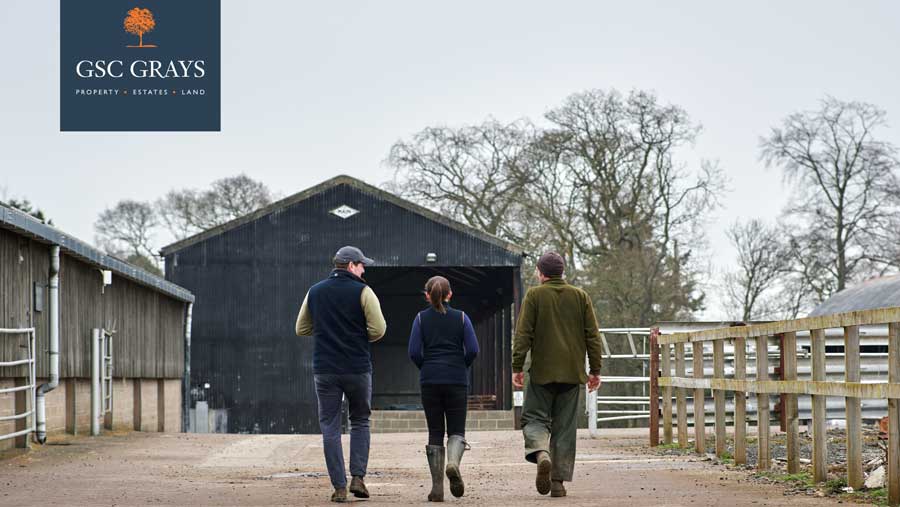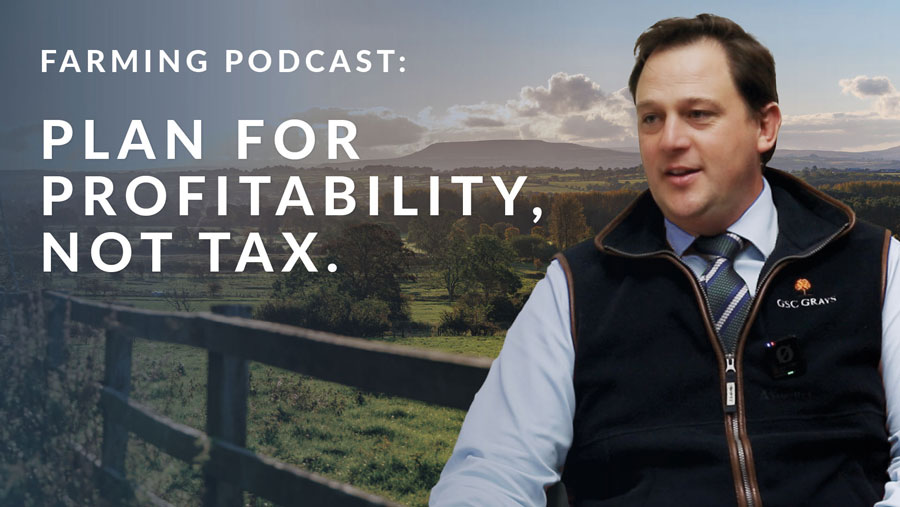Advertiser content
Why farmers should plan for profitability, not tax
 © GSC Grays
© GSC Grays The Budget’s proposed inheritance tax (IHT) reform has understandably sparked outrage among farmers who fear the increased financial burden will result in the need to sell land to meet tax obligations, and call time on the guaranteed ability to pass down farms to the next generation.
It has inevitably led to many conversations and meetings with clients worried about what to do next.
From 6 April 2026, a 20% inheritance tax will apply to combined agricultural and business assets valued over £1 million.
Previously, these assets were largely exempt thanks to agricultural property relief (APR) and business property relief (BPR).
These agricultural reliefs have protected farm businesses from being broken up at the whim of death, be that from old age, poor health, or worse a tragedy, since 1992.
About the author

Guy Coggrave, MRICS FAAV, managing director of GSC Grays
Guy is a highly experienced chartered surveyor with over 20 years’ professional practice in land agency and rural estate management, specialising in rural consultancy advice to estates, owner-occupiers and tenants throughout the north of England and Scottish Borders.
Succession! Succession! Succession!
While we are steadfast promoters of the need for farm businesses to plan for succession, something that, traditionally, some farmers have been averse to do – the Budget has provided an ‘urgency’ for many to start.
However, it is important to acknowledge that knee-jerk reactions could lead to regret further down the line if sufficient planning – including taking specialist advice – is not put in place.
In some cases, the available competent and compatible family members to involve in the business will force hard conversations, including whether succession outside the family, as by letting the land, is a better answer.
Or an acknowledgement that the land, business or both will need to be significantly restructured to accommodate the abilities and interests of the family members involved.
Considerations and risks
Potentially exempt transfers (PET) are often cited as the way to mitigate IHT liabilities, essentially gifting the farm business to the next generation.
Much has been said about the ‘7-year rule’, and tapered relief that this provides.
While this is high on the list of options, and does offer some protection, it comes with inherent risks.
- When is the right time? Start it too early, and you risk falling foul of amendments to legislation deeming the PET unnecessary. Start it too late and the risk is that you do not live long enough to benefit from the relief. It is a tricky balance but there can be cases where starting the PET clock outweighs the risk of moving ahead of the legislation.
- Once an asset is gifted there must be a full transfer of ownership without a reservation of benefit. This means the original owner can no longer derive any benefit from it. The need for income and accommodation can limit the ability to comply with this rule. Market rate rents must be paid, or income/accommodation away from the farm may need to be secured. Failure to do so may mean the gift will fail to meet the IHT rules.
- Some will need to afford the costs of care. How will this be factored into any arrangements once the business assets have been gifted?
- Farming is an inherently risky business and while reducing the risks of death’s roulette wheel, the young can (and sometimes do) die first.

© GSC Grays
How and when to start
It must be stressed that we do not expect to see the legislation, in whatever form it may be enacted, until summer 2025, which leaves eight months for informed planning before it comes into effect.
While uncertainty and risk remains, farmers should take this opportunity to give careful consideration as to their future plans.
Whatever legislation is published in the summer, those who have spent time to consider their business strategy will be better placed to adapt and implement whatever steps they wish to take, in what will be a tight timeframe with a limited number of advisers available to help.
With this in mind, we advocate clients consider a three-phase approach:
Three-phase approach |
||
|
Step |
Action |
Notes |
|
1. Preparation |
Consider short, medium, and long-term aims and objectives (both business and personal), including prior and anticipated financial performance. Consider what income you might need, how you would like assets to be distributed and when and how you would like certain scenarios to be managed. Consider the ‘what if’ scenarios; health, death, debt, divorce etc. Consider what impact will this have on the business?
|
Your land agent or farm business consultant will be able to support you during this phase and help facilitate family discussions. |
|
|
Collate current legal agreements – partnership agreements, shareholders agreements, tenancy agreements, wills, lasting power of attorneys (LPAs) etc. Consider updating wills as an interim measure to make the most of the IHT allowances.
|
|
|
|
Establish who owns which assets and prepare a statement of indicative values and liabilities by ownership – land, property, buildings, machinery, livestock, tenancy agreements including tenants’ improvements and fixtures, cash, stocks and shares, pensions, loans, overdraft, finance agreements etc. |
|
|
2. Review |
Arrange a collaborative meeting with the land agent, accountant, and solicitor to discuss your strategy and review the options available to achieving your goals and, in doing so, mitigate your tax liability. An all-parties meeting will be expensive but will be efficient and save money in the long run. |
This is best delivered by a collaborative approach between your land agent or farm business consultant, accountant and solicitor. |
|
|
Review the financial implications and check if there are changes to the tax regime, or if the ‘what if’ scenarios arise, you are comfortable with the proposed changes. |
|
|
3. Implementation |
Post the Finance Act (unless there are reasons to implement before), implement any restructuring needed, such as revised partnership and shareholders agreements, gifts, trusts, wills, LPAs, life insurances etc. and arrange any formal valuations required. |
|
Plan for profitability, not tax
Businesses must accept that any decisions taken must be done so with the inherent risk that the legislation changes further down the line, whether by the incumbent government or with a change in political party at the next general election.
As such, it is important that decisions should not be driven by the sole purpose of avoiding or minimising tax, and it is concerning that ministers have suggested this.
Rather, business decisions should be taken to optimise the business, to boost profitability and the ability to pay any taxes due, as and when they arise.

© GSC GRAYS
Stay updated on the latest farming developments by liking and subscribing to the GSC Grays podcast on YouTube and Spotify. Don’t miss the latest episode on strategic planning for your farming business — available now.
Provided by
GSC Grays are rural land and property experts providing specialist industry support and extensive cross-sector advisory services to farming businesses across the North of England and Scottish Borders.
With a reputation for delivering expert advice that creates opportunities, adds value, and achieves real results for clients, we understand that every business is different with its own specific needs.
By taking the time to understand you and your requirements, we provide a fully bespoke service designed to drive productivity and profitability.
Our innovative approach challenges traditional thinking to deliver practical and progressive advice through trusted local consultants across six key service areas:
For more information about GSC Grays, please visit https://www.gscgrays.co.uk
